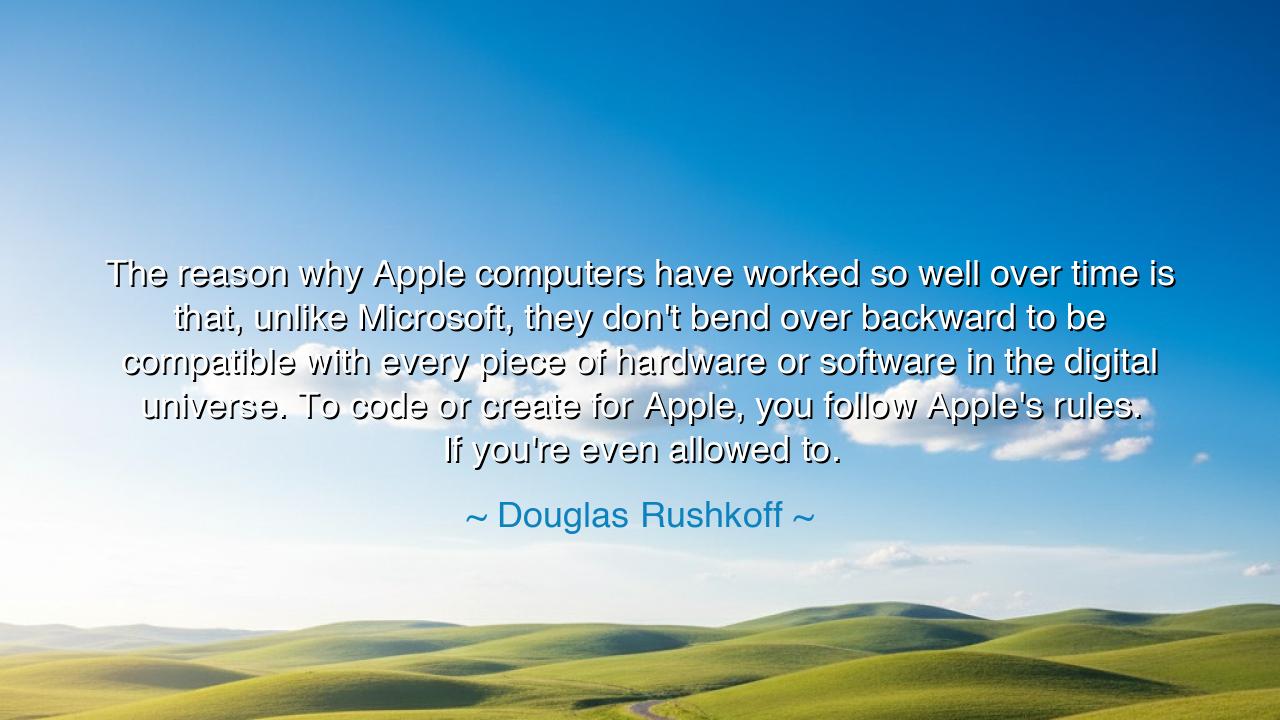
The reason why Apple computers have worked so well over time is
The reason why Apple computers have worked so well over time is that, unlike Microsoft, they don't bend over backward to be compatible with every piece of hardware or software in the digital universe. To code or create for Apple, you follow Apple's rules. If you're even allowed to.






The modern sage Douglas Rushkoff, whose voice bridges the worlds of technology and philosophy, once declared: “The reason why Apple computers have worked so well over time is that, unlike Microsoft, they don’t bend over backward to be compatible with every piece of hardware or software in the digital universe. To code or create for Apple, you follow Apple’s rules. If you’re even allowed to.” At first, these words may seem like a critique of corporate design or technological control, but beneath their sharpness lies a deeper truth about discipline, boundaries, and the cost of perfection. Rushkoff speaks not merely of computers, but of the eternal struggle between freedom and order, between the wildness of creation and the power of constraint.
In the realm of machines, as in life, there are two paths: one that opens itself to all possibility, and another that limits itself to mastery. Apple, in Rushkoff’s eyes, represents the second path—a kingdom governed by design, precision, and control. Its devices are crafted like temples: closed, elegant, and uncompromising. To create for them, one must submit to their laws, learn their language, honor their architecture. Microsoft, by contrast, sought universality—a great sprawling empire that strove to make room for all. It welcomed every program, every piece of hardware, every experiment, yet often at the price of coherence. Rushkoff’s observation reveals the ancient paradox of creation: that true harmony often demands limitation, and that greatness sometimes requires the courage to say no.
This truth was known to the ancients long before the digital age. The philosopher Aristotle taught that form gives life to matter, that without boundaries, even the most abundant potential remains formless chaos. The sculptor does not carve by addition but by removal, shaping the infinite stone into beauty through restraint. So too has Apple built its world—not by embracing all, but by refining the few. It has chosen the way of form over chaos, of singular vision over endless variation. Its success, Rushkoff implies, is not an accident of marketing but the result of discipline—the same discipline that guides any enduring art.
Consider the story of Leonardo da Vinci, whose notebooks overflowed with designs for machines centuries ahead of their time. Yet even Leonardo, the restless mind of the Renaissance, knew that genius must yield to focus. He wrote, “He who loves practice without theory is like the sailor who boards ship without a rudder.” The rudder—the guiding constraint—is what directs imagination to purpose. In the same way, Apple’s strict rules and closed systems serve as the rudder of innovation. Those who build within its boundaries may find less freedom, but more harmony. Their creations, like Leonardo’s, are shaped not by whim but by precision.
And yet, Rushkoff’s words carry both admiration and unease. For with such power comes danger. When a system becomes too closed, it risks turning from discipline to dominion, from harmony to hierarchy. “If you’re even allowed to,” he warns—a phrase heavy with meaning. It reminds us that control, though useful in creation, can also suppress the very spirit that gave rise to it. The same walls that preserve quality may also imprison potential. Here lies the eternal tension between authority and liberty, between the architect and the explorer.
The lesson, then, is not to reject either path but to seek balance between them. Embrace structure, for it brings strength; embrace freedom, for it brings life. Whether in art, technology, or the shaping of one’s own destiny, learn to discern when rules sharpen your purpose and when they dull your imagination. The wise creator is not enslaved by either chaos or control, but moves between them as a musician between notes—finding harmony in the tension.
So, my children of the digital age, remember Douglas Rushkoff’s insight. The machine world mirrors the human soul: some are open and wild like the plains, others closed and deliberate like the fortress. Both can thrive—but only if they remain in service of the greater good. Do not despise the gate that guards the garden, but do not worship it either. Create with respect for form, yet never lose the wild spark of freedom. For in that balance lies the art of all creation—whether of code, of story, or of life itself.
Thus, as Rushkoff reminds us, rules can shape beauty, but only wisdom can make it endure. Follow structure when it refines you, break it when it confines you, and always remember that even the most perfect system must serve the imperfect, infinite wonder of the human heart.






AAdministratorAdministrator
Welcome, honored guests. Please leave a comment, we will respond soon